2001年10月7日,,以美國為首的聯(lián)軍對阿富汗塔利班和基地組織目標發(fā)動了空襲,。幾小時后,時任美國總統(tǒng)喬治?W?布什向全國人民發(fā)表講話——當時的美國仍然深深地籠罩在“9?11”恐怖襲擊事件的陰霾中,。
“這場戰(zhàn)爭不是我們要求的,,但我們會完成任務。今天的這場軍事行動代號叫做‘持久自由’(Enduring Freedom),?!彼f?!霸诮酉聛淼膸讉€月里,,我們要有耐心,把它當作自己的一項優(yōu)勢——耐心等待更嚴格的安全措施出臺,,盡管這可能是一個漫長的過程,;耐心等待并理解實現(xiàn)我們的目標需要時間;還要耐心看待在這期間可能出現(xiàn)的所有犧牲,?!?/p>
將近20年后,美國軍隊——如今在役的都是一些在2001年襲擊事件之后出生的年輕男女——從塔利班控制下的阿富汗撤出,。人們的耐心幾乎已經(jīng)被磨得消失殆盡,。
“現(xiàn)在,我已經(jīng)是第四位指揮阿富汗戰(zhàn)爭的美國總統(tǒng)了,。四人中,,有兩位是民主黨人,兩位是共和黨人,?!?本周,現(xiàn)任美國總統(tǒng)喬?拜登在全國講話中說,?!拔也粫堰@個責任再傳給第五任總統(tǒng)了。我不會誤導美國人民,,聲稱在阿富汗多堅持一會兒,,就會讓一切變得不同……我是美國總統(tǒng),阿富汗的爛攤子就到我這里為止,?!?/p>
這場“永遠的戰(zhàn)爭”到底耗費了美國多少時間、金錢和生命,?阿富汗戰(zhàn)爭是美國參戰(zhàn)時間最長的戰(zhàn)爭,,但和其他戰(zhàn)爭相比,也沒有長很多,。美國對伊拉克的軍事干預——也是在“9?11”襲擊事件之后發(fā)生的——還有越南戰(zhàn)爭,,都花了差不多長的時間,并且兩者也都是以相似的混亂僵局而告終,,除了那些投資軍事防御技術(shù)的人之外,,沒有一方能夠稱得上是贏家。
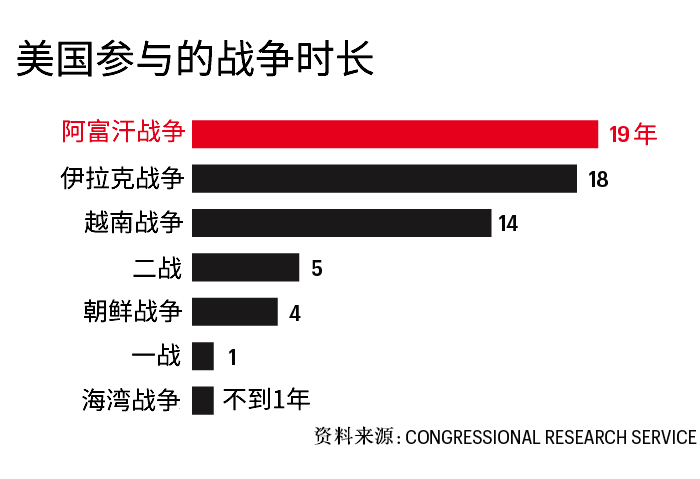
在阿富汗開展持久戰(zhàn)的想法是由美國國防部前部長唐納德?拉姆斯菲爾德提出的,。2001年12月,,在入侵阿富汗兩個月后,他拒絕了塔利班提出的請降要求,。他在當時表示:“我認為,,雙方不可能通過談判的方式達成一致,最終談成的結(jié)果一定是美國無法接受的,?!?/p>
在2006年從政府部門辭職時,他警告美國不要從阿富汗撤軍,?!耙苍S對某些人來說,考慮從痛苦,、甚至是丑陋的戰(zhàn)爭的中優(yōu)雅地退出,,會令人感到欣慰。但敵人可不是這么想的,?!彼f。拉姆斯菲爾德在今年夏天逝世——就在戰(zhàn)爭結(jié)束的不久以前,。
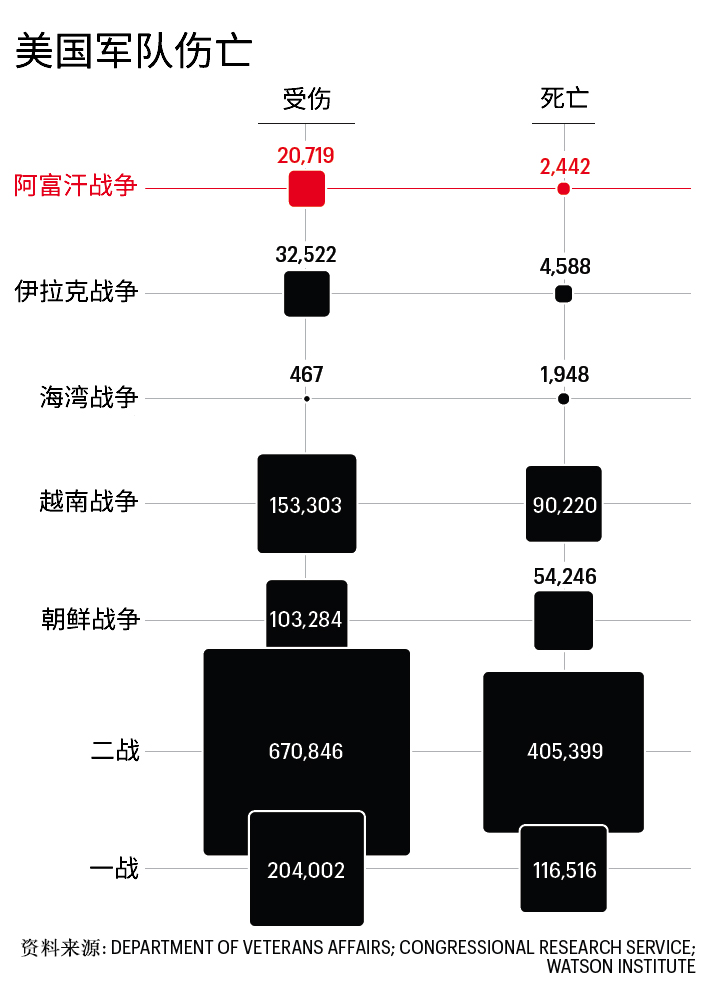
與此同時,,陣亡士兵的數(shù)量不斷增加,盡管和過去的戰(zhàn)爭相比還是少得多了,。無人機技術(shù)和其他機器人戰(zhàn)爭的出現(xiàn),,使得軍人的傷亡數(shù)量顯著減少。這場持久戰(zhàn)的本質(zhì)主要集中于在阿富汗建立政權(quán),,因而軍隊改組后不怎么關(guān)注戰(zhàn)斗本身,,而是更多地關(guān)注阿富汗軍隊的訓練。盡管如此,,由于美軍中沒有出現(xiàn)大規(guī)模傷亡,,在美國人過著尋常生活的時候,戰(zhàn)火在阿富汗的土地上肆虐,,而這在很大程度上被他們忽視了,。
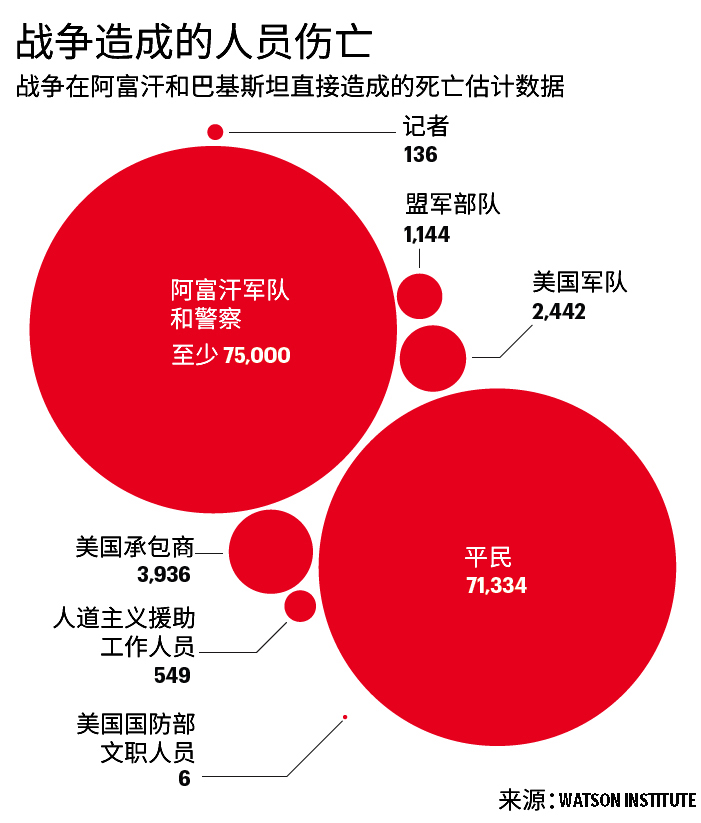 然而,阿富汗人的傷亡數(shù)量非常高,。據(jù)估計,,有75,000名阿富汗軍人和警察直接死于戰(zhàn)火,,另外估計有71,334名平民直接死于戰(zhàn)爭。很難給出確切數(shù)字,,因為五角大樓在2001年改變了政策,,不再編制或發(fā)布死亡的平民人數(shù)。
然而,阿富汗人的傷亡數(shù)量非常高,。據(jù)估計,,有75,000名阿富汗軍人和警察直接死于戰(zhàn)火,,另外估計有71,334名平民直接死于戰(zhàn)爭。很難給出確切數(shù)字,,因為五角大樓在2001年改變了政策,,不再編制或發(fā)布死亡的平民人數(shù)。
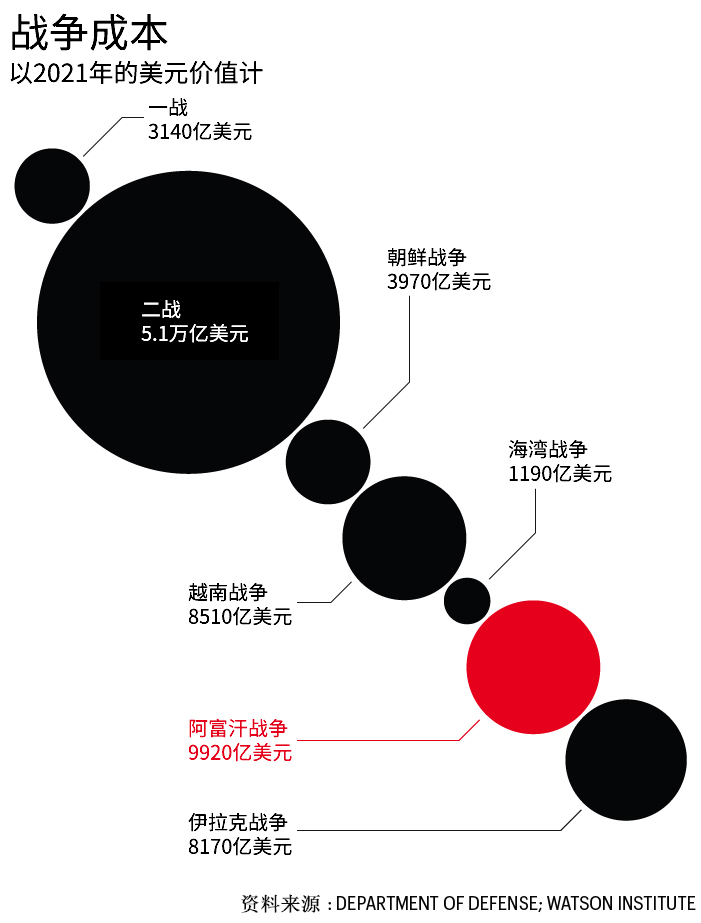
戰(zhàn)爭給美國帶來的真實成本同樣難以準確衡量,,但可能接近1萬億美元,。這些成本中很大一部分(約830億美元)用來為阿富汗建設軍隊,并向他們提供美式軍事武器,。在美國撤軍,、阿富汗軍隊垮臺后,這些武器,、槍支,、直升機和車輛有很大一部分落入了塔利班手中。
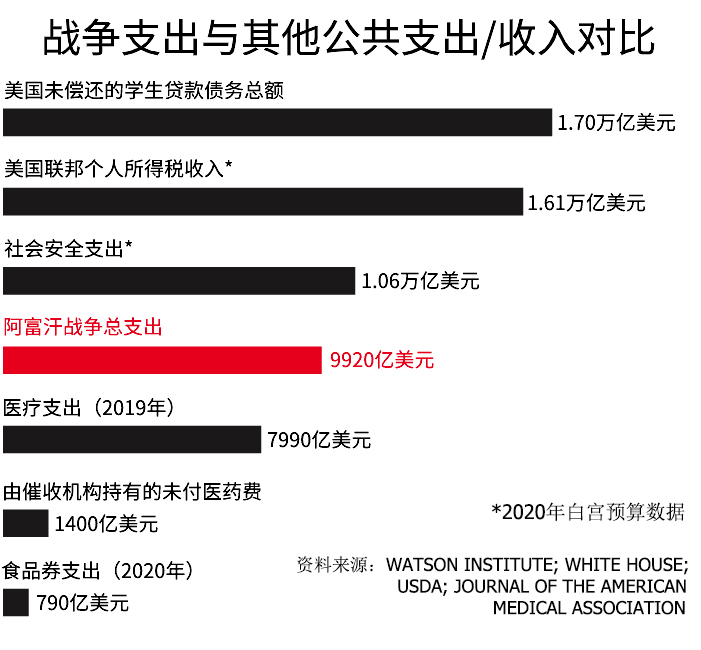
每年,,戰(zhàn)時支出都在聯(lián)邦預算中占據(jù)大頭,。目前,美國的國防支出全球第一,,并且比后11名國家的總和還多,。根據(jù)這些數(shù)字計算,近20年來,,美國每天在戰(zhàn)爭上的花費約為1.36億美元,,大約相當于在阿富汗的4,000萬人身上、每人花費25,000美元,。而這些成本可能還是被低估了,。布朗大學(Brown University)的“戰(zhàn)爭的代價”項目(Costs of War Project)估計,如果把未來的退伍軍人護理費和戰(zhàn)爭貸款的利息包括在內(nèi),,真實成本將接近2.26萬億美元,。(財富中文網(wǎng))
編譯:陳聰聰、楊二一
2001年10月7日,,以美國為首的聯(lián)軍對阿富汗塔利班和基地組織目標發(fā)動了空襲,。幾小時后,時任美國總統(tǒng)喬治?W?布什向全國人民發(fā)表講話——當時的美國仍然深深地籠罩在“9?11”恐怖襲擊事件的陰霾中,。
“這場戰(zhàn)爭不是我們要求的,,但我們會完成任務。今天的這場軍事行動代號叫做‘持久自由’(Enduring Freedom),?!彼f?!霸诮酉聛淼膸讉€月里,,我們要有耐心,,把它當作自己的一項優(yōu)勢——耐心等待更嚴格的安全措施出臺,盡管這可能是一個漫長的過程,;耐心等待并理解實現(xiàn)我們的目標需要時間,;還要耐心看待在這期間可能出現(xiàn)的所有犧牲?!?/p>
將近20年后,美國軍隊——如今在役的都是一些在2001年襲擊事件之后出生的年輕男女——從塔利班控制下的阿富汗撤出,。人們的耐心幾乎已經(jīng)被磨得消失殆盡,。
“現(xiàn)在,我已經(jīng)是第四位指揮阿富汗戰(zhàn)爭的美國總統(tǒng)了,。四人中,,有兩位是民主黨人,兩位是共和黨人,?!?本周,現(xiàn)任美國總統(tǒng)喬?拜登在全國講話中說,?!拔也粫堰@個責任再傳給第五任總統(tǒng)了。我不會誤導美國人民,,聲稱在阿富汗多堅持一會兒,,就會讓一切變得不同……我是美國總統(tǒng),阿富汗的爛攤子就到我這里為止,?!?/p>
這場“永遠的戰(zhàn)爭”到底耗費了美國多少時間、金錢和生命,?阿富汗戰(zhàn)爭是美國參戰(zhàn)時間最長的戰(zhàn)爭,,但和其他戰(zhàn)爭相比,也沒有長很多,。美國對伊拉克的軍事干預——也是在“9?11”襲擊事件之后發(fā)生的——還有越南戰(zhàn)爭,,都花了差不多長的時間,并且兩者也都是以相似的混亂僵局而告終,,除了那些投資軍事防御技術(shù)的人之外,,沒有一方能夠稱得上是贏家。
在阿富汗開展持久戰(zhàn)的想法是由美國國防部前部長唐納德?拉姆斯菲爾德提出的,。2001年12月,,在入侵阿富汗兩個月后,他拒絕了塔利班提出的請降要求,。他在當時表示:“我認為,,雙方不可能通過談判的方式達成一致,,最終談成的結(jié)果一定是美國無法接受的?!?/p>
在2006年從政府部門辭職時,,他警告美國不要從阿富汗撤軍?!耙苍S對某些人來說,,考慮從痛苦、甚至是丑陋的戰(zhàn)爭的中優(yōu)雅地退出,,會令人感到欣慰,。但敵人可不是這么想的?!彼f,。拉姆斯菲爾德在今年夏天逝世——就在戰(zhàn)爭結(jié)束的不久以前。
與此同時,,陣亡士兵的數(shù)量不斷增加,,盡管和過去的戰(zhàn)爭相比還是少得多了。無人機技術(shù)和其他機器人戰(zhàn)爭的出現(xiàn),,使得軍人的傷亡數(shù)量顯著減少,。這場持久戰(zhàn)的本質(zhì)主要集中于在阿富汗建立政權(quán),因而軍隊改組后不怎么關(guān)注戰(zhàn)斗本身,,而是更多地關(guān)注阿富汗軍隊的訓練,。盡管如此,由于美軍中沒有出現(xiàn)大規(guī)模傷亡,,在美國人過著尋常生活的時候,,戰(zhàn)火在阿富汗的土地上肆虐,而這在很大程度上被他們忽視了,。
然而,,阿富汗人的傷亡數(shù)量非常高。據(jù)估計,,有75,000名阿富汗軍人和警察直接死于戰(zhàn)火,,另外估計有71,334名平民直接死于戰(zhàn)爭。很難給出確切數(shù)字,,因為五角大樓在2001年改變了政策,,不再編制或發(fā)布死亡的平民人數(shù)。
戰(zhàn)爭給美國帶來的真實成本同樣難以準確衡量,,但可能接近1萬億美元,。這些成本中很大一部分(約830億美元)用來為阿富汗建設軍隊,并向他們提供美式軍事武器。在美國撤軍,、阿富汗軍隊垮臺后,,這些武器、槍支,、直升機和車輛有很大一部分落入了塔利班手中,。
每年,戰(zhàn)時支出都在聯(lián)邦預算中占據(jù)大頭,。目前,,美國的國防支出全球第一,并且比后11名國家的總和還多,。根據(jù)這些數(shù)字計算,,近20年來,美國每天在戰(zhàn)爭上的花費約為1.36億美元,,大約相當于在阿富汗的4,000萬人身上、每人花費25,000美元,。而這些成本可能還是被低估了,。布朗大學(Brown University)的“戰(zhàn)爭的代價”項目(Costs of War Project)估計,如果把未來的退伍軍人護理費和戰(zhàn)爭貸款的利息包括在內(nèi),,真實成本將接近2.26萬億美元,。(財富中文網(wǎng))
編譯:陳聰聰、楊二一
On Oct. 7, 2001, a U.S.-led coalition launched air strikes on Taliban and al Qaeda targets in Afghanistan. Hours later, President George W. Bush addressed a nation still reeling from the aftershocks of the Sept. 11 terrorist attacks.
“We did not ask for this mission, but we will fulfill it. The name of today's military operation is Enduring Freedom,” he said. “In the months ahead, our patience will be one of our strengths—patience with the long waits that will result from tighter security; patience and understanding that it will take time to achieve our goals; patience in all the sacrifices that may come.”
Nearly two decades later, the U.S. military—now serviced by some young men and women who were born after the 2001 attacks occurred—withdrew from Taliban-held Afghanistan. Patience had worn thin.
“I’m now the fourth American President to preside over war in Afghanistan. Two Democrats and two Republicans,” President Joe Biden said in a national address this week. “I will not pass this responsibility on to a fifth President. I will not mislead the American people by claiming that just a little more time in Afghanistan will make all the difference…I am President of the United States of America, and the buck stops with me.”
Just how much time, dollars, and lives have been spent on the "forever war"? The war in Afghanistan is the longest the U.S. has engaged in, but not by a lot. Involvement in Iraq—which also followed the 9/11 attacks—and Vietnam were similarly long and both ended in similar, confused stalemates with no winners to be declared except perhaps those who invested in defense technology.
The idea of the ongoing war in Afghanistan was promoted by former Secretary of Defense Donald Rumsfeld. In December 2001, two months after invading the country, he denied a plea by the Taliban to broker a surrender. “I do not think there will be a negotiated end to the situation that's unacceptable to the United States,” he said at the time.
Upon his exit from government in 2006 he warned against pulling out. “It may well be comforting to some to consider graceful exits from the agonies and, indeed, the ugliness of combat. But the enemy thinks differently,” he said. Rumsfeld passed away this summer, before the war ended.
Meanwhile, military deaths racked up, though nowhere near the level they had in past wars. The advent of drone technology and other robotic warfare led to a significant decrease in military casualties. The nature of the enduring war, which centered largely on nation-building, led to a restructured military with less focus on fighting and more on training the Afghan army. Still, the lack of massive American casualties allowed the war to rage on in the background of American life, largely unnoticed.
Civilian casualties in Afghanistan, however, were extraordinarily high. An estimated 75,000 Afghan military and police officers perished in direct war deaths and an additional estimated 71,334 civilians died directly because of war. It’s difficult to give exact numbers because the Pentagon changed its policy in 2001 and stopped compiling or releasing civilian body counts.
The true costs of the war to the U.S. are similarly difficult to measure, but they likely neared $1 trillion. A large portion of those costs—about $83 billion—came from building and supplying Afghan forces with U.S. military weapons. After the U.S. withdrawal and the collapse of Afghanistan’s military, a significant portion of those weapons, guns, helicopters, and vehicles fell into the hands of the Taliban.
Wartime spending ate up a significant portion of the federal budget each year, and the United States currently spends more on defense than the next 11 countries combined. By those calculations, the United States spent about $136 million dollars per day on the war every day for nearly 20 years, as well as a total of about $25,000 for each of the 40 million people living in Afghanistan. And these costs may be low estimates. Brown University’s Costs of War Project estimates the true cost to be closer to $2.26 trillion when future veteran care and interest on war borrowing are included.






